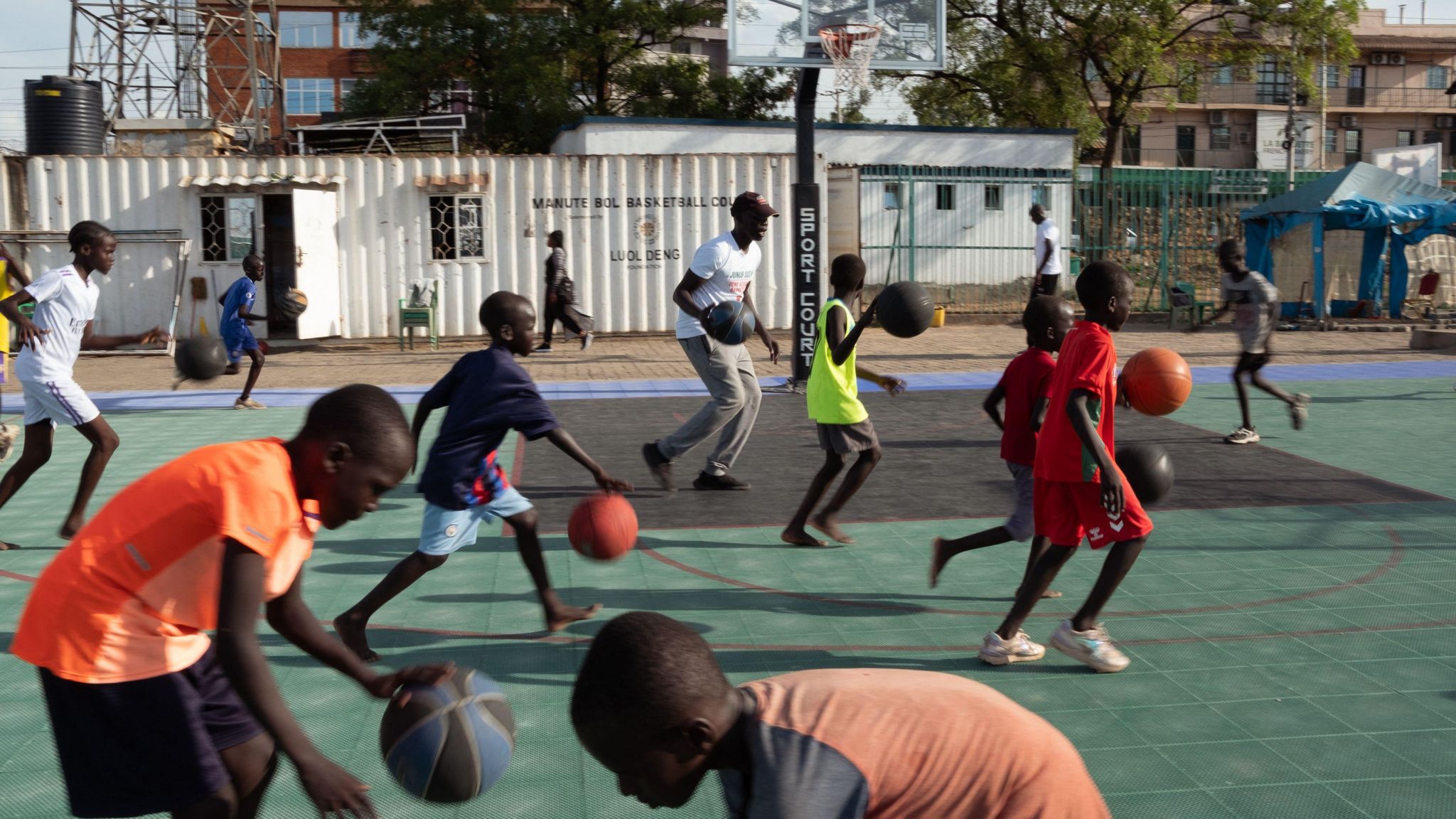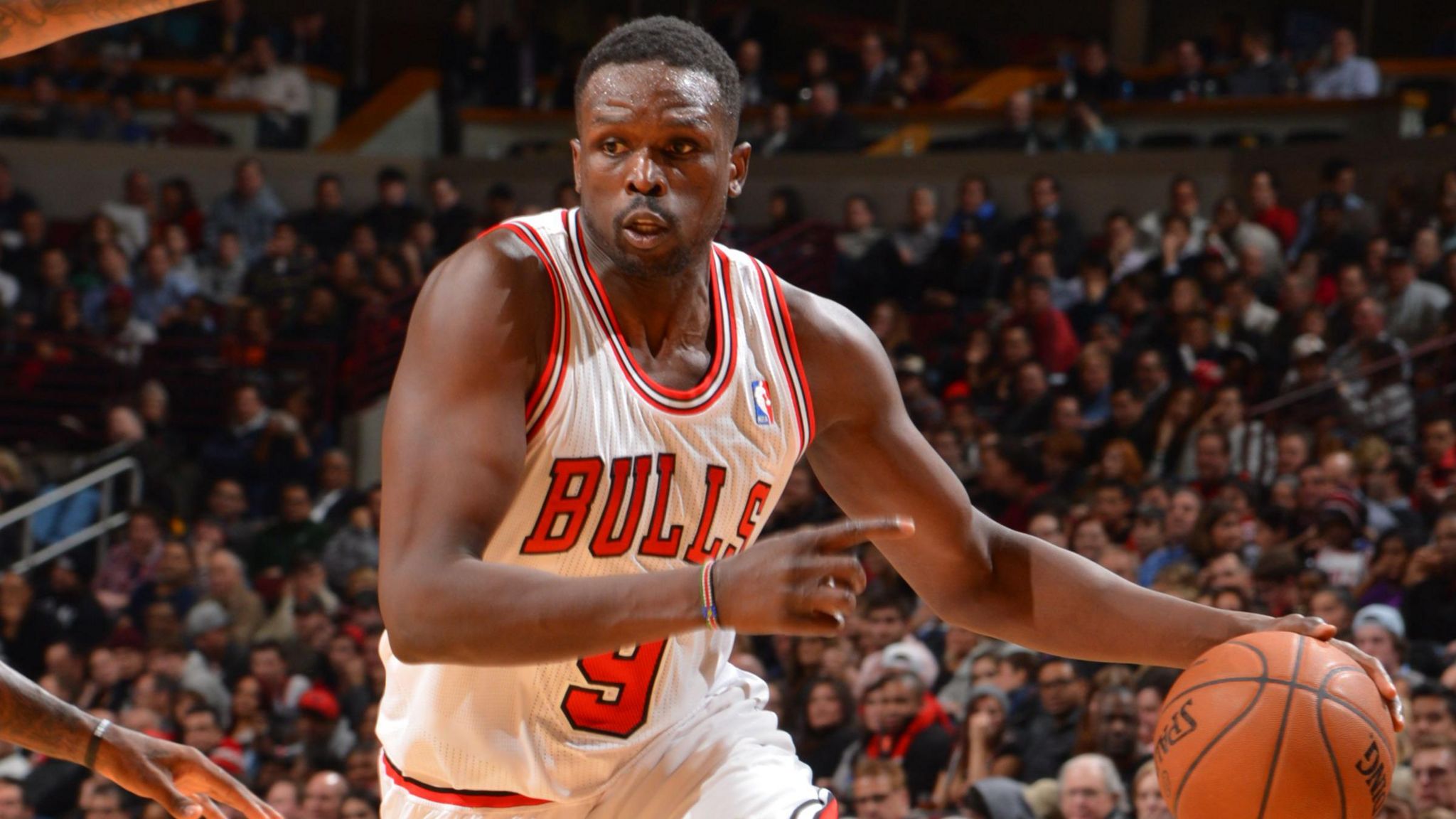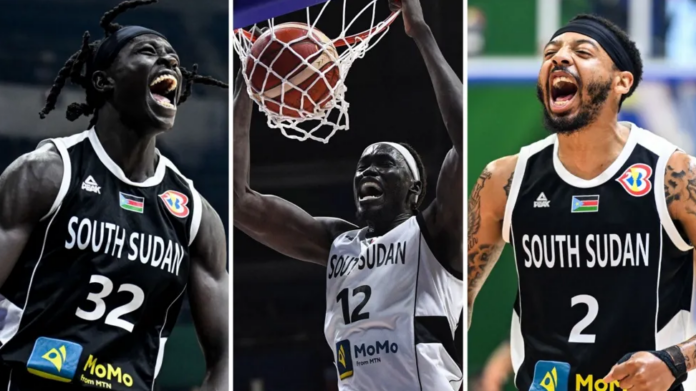Having fought through one of the longest civil wars on record, South Sudan’s early history was defined by conflict. But now the youngest nation in the world is forging a new identity through basketball.
Their success has seen the men’s national side, the Bright Stars, book a spot at the Paris 2024 Olympics and also come within seconds of a historic win over the United States at the weekend.
Former National Basketball Association (NBA) star Luol Deng has been a major inspiration behind their rise.
“Since I was born, I have known nothing but conversations about war,” Deng, who spent 15 years in the NBA, told BBC Sport Africa.
“Whenever I was in school, even when I was in the NBA, it was always ‘refugees left because of war’ and ‘war-torn country’.
“Now we are finding a new story.”
Deng was one of those refugees himself, fleeing with his family as a child and eventually settling in the United Kingdom, but has returned to head the South Sudan Basketball Federation.
The country, which gained independence from Sudan in 2011, is now one which exports world-class players to the NBA and secured an Olympic berth via their first appearance at the Fiba World Cup last year.
“You know how proud every South Sudanese is when you talk about basketball,” Deng, 39, said.
“Even if they don’t play basketball, they can’t wait to tell you about it. It’s a relief. Finally, we have something positive to say.
“Being the youngest nation in the world, we don’t have many stories to share.”
Making ‘history for life’ in Paris
Over the past couple of years, Aketch Wuoi, a refugee making a living teaching basketball away from home in Kampala, Uganda, has followed a shining light – the Bright Stars.
“South Sudan has 64 tribes and the team is made up of people from different regions, backgrounds and clans,” Wuoi told BBC Sport Africa.
“As a South Sudanese, seeing people play at that stage, you must support that and be proud.”
As the Bright Stars prepare for the Games, the squad of 12 players is larger in number than the total of athletes who have previously competed in the Olympics under the South Sudanese flag since the nation’s debut in 2016.
“For these guys to be the first group to ever raise the flag of South Sudan in the Olympics… that’s history for life,” Deng said.
“It also inspires the diaspora to return back home and do something positive.”
But why basketball? What is the special relationship between this young nation and the orange ball?
“South Sudan is unique,” Deng, a two-time NBA All-Star, explained.
“You have many South Sudanese that are very lanky, tall, very athletic. Genetically, basketball is a sport that goes well with us.”
Deng ‘saw potential’ of South Sudan
 IMAGE SOURCE: GETTY IMAGES
IMAGE SOURCE: GETTY IMAGES
Image caption: The Luol Deng Academy in Juba offers facilities and training to the next generation of South Sudanese basketballers
Deng never won an NBA championship but remains one of the most successful African players to feature in the league, with a decade spent with the Chicago Bulls before stints at the Los Angeles Lakers, Miami Heat, Cleveland Cavaliers and Minnesota Timberwolves.
He has established the Deng Academy to inspire young people in South Sudan’s capital Juba and his adopted home of London, giving them a pathway to realise their potential.
“I saw the potential of the country. I knew that we can be good,” Deng, who was appointed South Sudan Basketball Federation president in 2019, said.
“I wanted to implement everything that I’ve learned throughout my career and my journey into a team, a nation and a federation.”
 IMAGE SOURCE: GETTY IMAGES
IMAGE SOURCE: GETTY IMAGES
Image caption: The bulk of Luol Deng’s time in the NBA was spent with the Chicago Bulls
Progress has not always been easy, as the former forward was forced to fund the team from his own pocket.
“It was tough because there’s no resources,” he said.
“I knew that we could get a lot of attention by playing some of the best basketball in the continent, but the goal is to be one of the best in the world.”
Having helped Great Britain to the 2012 Olympics, Deng was aware of the work he needed to put in to realise the dream of reaching the Games with South Sudan.
Deng says qualifying – courtesy of being the top-ranked African side at the World Cup – felt “100 times better” than when he confirmed his place as a player.
“That’s not taking anything away from Great Britain, but seeing my players experience it was special,” he said.
“I’m so excited for them because these guys are going to be Olympians.”
A daunting group
The Bright Stars, who began their preparations for Paris at the end of last month, will play Puerto Rico, the United States and Serbia in the group stage.
Their task is daunting, given the USA are 16-time gold medal winners – including at the past four Games – and have assembled one of the greatest basketball teams of all time.
Dubbed ‘The Avengers’ by the sport’s fanatics, the squad includes NBA stars LeBron James, Steph Curry, Joel Embiid and Kevin Durant.
“They are the best in the world and it’s a tough group,” said Deng.
“But, for us, it’s something special with the talent that we have.”
So how can South Sudan match up with the best in the world in the long term?
“We do have the product, but we don’t have the facilities to produce great players,” Deng added.
“We can get good players but if we want great players at a number that we want, and the coaches [with] the knowledge, we must invest.
“I grew up in the UK and I went to the US. I had great coaches and the best facilities. I’m still a product of Africa, but the reason why I made it was because I was over there.
“So, for us to be in Olympics and compete is great, but to be where they are… we’re not there yet.”
The Bright Stars tuned up for Paris with an 84-81 win over Great Britain before falling to that 101-100 defeat against the USA in London.
“They tested us and it was a competitive game,” USA forward Anthony Edwards said after their clash at the O2 on Saturday.
“They have got some good players. They showed us we can be beat.”
Now the aim for South Sudan is to make further history in the French capital.
“Everyone has been celebrating us since we qualified,” Deng said.
“That’s all done. You have to have that mindset of ‘We have got to accomplish something else now’.”

